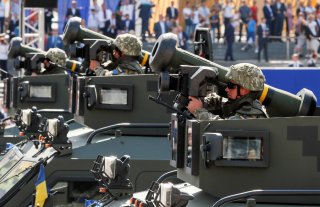Britain Sends Anti-Tank Missiles to Bolster Ukraine's Military
Secretary of State for Defense Ben Wallace stressed that they are not strategic weapons.
British secretary of state for defense Ben Wallace told the country’s Parliament on Monday that the government has “taken the decision to supply Ukraine with light anti-armor defensive weapon systems” intended to bolster its military ahead of a potential Russian invasion.
The first batch of the weapons was delivered on Monday, Wallace said, and a small group of British personnel will train the Ukrainians in their use over a short period of time. The secretary did not provide details on the number of weapons or trainers involved in the operation.
“They are not strategic weapons,” Wallace insisted, noting that Russian tanks could not conceivably be put in danger by the short-range missiles unless they tried to enter Ukraine.
“Nevertheless, it would make people pause and think what they were doing, and if tanks were to roll into Ukraine … then [the missiles] would be part of the defense mechanism,” he said.
Officials in Kiev welcomed the development, with Ukrainian Defense Minister Oleksii Reznikov tweeting, “Ukraine highly appreciates Britain’s decision to provide a new security package with light, anti-armor, defensive weapons systems!”
Kiev’s requests for military assistance have increased as Russia has steadily built up forces along the Ukrainian border over the past two months. While the Kremlin has denied planning an invasion of Ukraine, it has warned that it views NATO expansion into eastern Europe as a critical national security threat.
In December, Russian diplomats proposed a draft treaty with NATO that would require the alliance to firmly commit to excluding Ukraine from any future enlargement. U.S. and NATO officials have rejected this demand outright. Although negotiations between Russia and the West took place in early January, they ended last week without firm commitments from either side.
Ukrainian officials warned that an invasion could occur when Russian troops deploy to Belarus in February for a series of joint military exercises. The presence of Russian troops in Belarus, which borders Ukraine to the north, highlights the possibility of an invasion from three different directions.
The New York Times also reported on Tuesday that Russian diplomatic personnel had begun to withdraw from the Russian Embassy in Kiev, a potential precaution against unrest in Ukraine’s capital.
In a separate development, the government of Canada indicated earlier in the week that it sent a small group of special forces to Kiev. Canada’s Global News reported that Canadian troops were tasked with drawing up evacuation plans for Canadian diplomats in Kiev but would also assist Ukrainian security forces and seek to deter Russian aggression.
Trevor Filseth is a current and foreign affairs writer for the National Interest.
Image: Reuters

